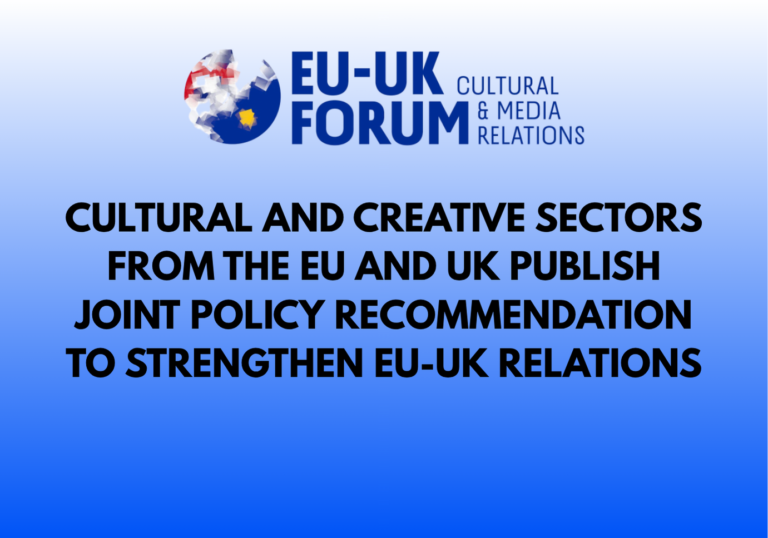Cultural and Creative Sectors from the EU and UK publish
joint Policy Recommendations to strengthen EU-UK relations

Brussels, 11th November 2025,
More than 200 stakeholders from the EU’s and the UK’s Cultural and Creative Sectors (CCS) – often
referred to in the UK as “creative industries” – today published joint Policy Recommendations developed
at the inaugural Forum on EU-UK Cultural & Media Relations, held on 20 October 2025 in Brussels.
Around 40 CCS representatives from the EU and the UK as well as governmental and parliamentary
observers from both sides of the Channel contributed to the development and drafting of the document.
The Policy Recommendations emphasise that culture and creativity are vital to the political, societal and
economic relationship between the EU and UK, particularly at a time of growth of the CCS, rapidly
evolving technologies and new regulatory challenges.
The signatories – including many organisations and networks such as British Screen Forum, Culture Action
Europe, the European Music Council, On the Move and UK Music – call on EU and UK policymakers to
commit to practical measures, including:
● Full UK participation in the EU’s Creative Europe programme and its proposed successor AgoraEU
(2028-2034)
● Remove barriers to cross-border mobility of CCS professionals, making it easier to work between
the UK and the rest of Europe
● Establish a structured CCS dialogue, giving CCS representatives from both the EU and the UK the
opportunity to highlight and address barriers to ensure stronger EU-UK collaboration
● Address the impact of emerging technologies on the CCS, such as Generative AI, with joint efforts
The contribution of the CCS (or “creative industries”, as commonly referred to in the UK) to the
EU’s and the UK’s GDP is estimated to be around 4-7% by different sources, with overall more
than 10 million people working in it. (UK source)
– The UK, since 2024, participates in Horizon Europe, the EU’s research and innovation cooperation
funding programme, and there have been sustained calls for it to participate again in Erasmus+.
– Creative Europe is the EU’s cooperation and funding programme aimed at the CCS. Non-EU
countries can participate – currently there are 14, including Norway, Serbia, Iceland, Tunisia,
Georgia and Ukraine.
– Several campaigns and open letters have previously called for improved EU-UK conditions for the
sectors:
● Face the Music campaign on artist mobility
● BOZAR recommendations (2018)
● Open letter from UK arts sector (2020)
● Open letter from European sector representatives (2020)
● High-profile artists have campaigned for change
– Culture is a devolved matter in the UK. The Scottish Government has set out its desire for
renewed association with the Creative Europe programme and the Welsh Government has also
expressed support.
About IMPALA
IMPALA was established in 2000 and now represents over 6000 independent music companies in Europe. 99% of Europe’s music companies are small, micro and medium businesses and self-releasing artists. Known as the independents, they are world leaders in terms of innovation and discovering new music and artists – they produce more than 80% of all new releases and account for 80% of the sector’s jobs. IMPALA’s mission is to grow the independent music sector sustainably, return more value to artists, promote diversity and entrepreneurship, improve political access, inspire change, and increase access to finance. IMPALA works on a range of key issues for its members and started a new co-funded work programme as an EU cultural network in 2025. IMPALA runs various award schemes and has a programme aimed at businesses who want to develop a strategic relationship with the European independent sector – Friends of IMPALA

